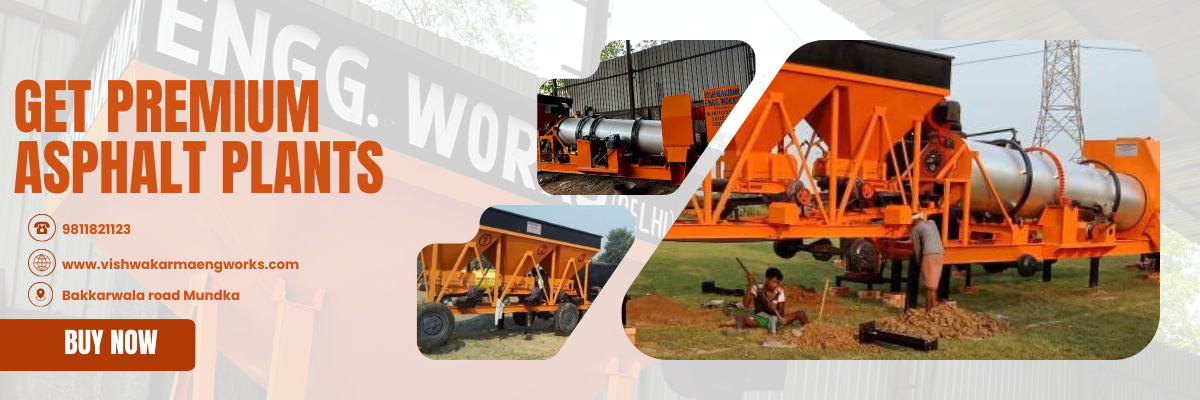Vishwakarma Engineering Works – Manufacturing of Asphalt Plants
Vishwakarma Engineering Works is a renowned manufacturer of high-quality Asphalt Plants that are essential for road and highway construction projects. With years of experience in the industry, we have built a strong reputation for producing reliable and efficient asphalt plants that meet the demands of construction agencies. In this blog, we will explore the different types of Asphalt Plants, their classification, and how they work.
1. What are the Types of Asphalt Plants?
Asphalt plants come in various types, each designed for different types of road construction needs. The two main types of Asphalt Plants are:
- Batch Mix Asphalt Plant: This type of asphalt plant mixes the raw materials in batches, providing better control over the quality of the asphalt produced. It is widely used in projects that require precise quality standards and flexibility.
- Drum Mix Asphalt Plant: The drum mix plant continuously mixes the raw materials, making it more suitable for large-scale production. It is known for its efficiency and cost-effectiveness, especially for high-volume production.
2. The Basis of Classification of Asphalt Mixing Plants
Asphalt plants can be classified based on several criteria. The most common classifications include:
- By the method of mixing: Asphalt plants are generally classified into batch mix and drum mix plants based on the method of mixing raw materials.
- By the mobility: Asphalt plants can be stationary or mobile, depending on the specific requirements of the construction project.
- By production capacity: Asphalt plants can also be classified by their production capacity, which ranges from small to large-scale production based on the output required.
3. Based on the Mobility
The mobility of an asphalt plant plays an important role in deciding where it can be used and how efficiently it can serve different construction projects. There are two main types of asphalt plants based on their mobility:
Asphalt Drum Mix Plants
Asphalt Drum Mix Plants are highly efficient and designed for continuous mixing of asphalt. These plants are known for their simplicity, easy setup, and operation. They are ideal for projects requiring large volumes of asphalt in a short time. They are often used in road construction and large-scale highway maintenance projects.
Asphalt Batch Mix Plants
Asphalt Batch Mix Plants, on the other hand, produce asphalt in batches, making them ideal for projects that demand more control over the quality of the asphalt. They are preferred for applications where precise control is needed, such as in urban roads and specialized infrastructure projects.
4. How Does an Asphalt Plant Work?
The working of an asphalt plant involves several key stages that are essential to produce high-quality asphalt. Here is a breakdown of the process:
- Heating of Aggregates: The raw aggregates, such as sand, gravel, and crushed stone, are heated in a drum or batch mixer to remove any moisture and prepare them for mixing with the asphalt binder.
- Mixing of Asphalt Binder: The asphalt binder, typically bitumen, is heated and mixed with the aggregates to create a homogeneous mixture of asphalt.
- Storage: The finished asphalt is stored in silos to keep it at the optimal temperature until it is ready to be used in road construction.
- Transportation: The asphalt is then transported to the construction site, where it is laid on the roadbed for compaction and further processing.
At Vishwakarma Engineering Works, we ensure that our Asphalt Plants are equipped with the latest technology to provide high efficiency, minimal environmental impact, and maximum durability. Our plants are designed to meet the demands of both small and large-scale projects.
If you’re looking to buy reliable and high-performance Asphalt Plants, visit our product page for more details and specifications.
For more information on construction machines in India, you can also visit Construction Machines India and TradeIndia’s Construction Machinery Section.





